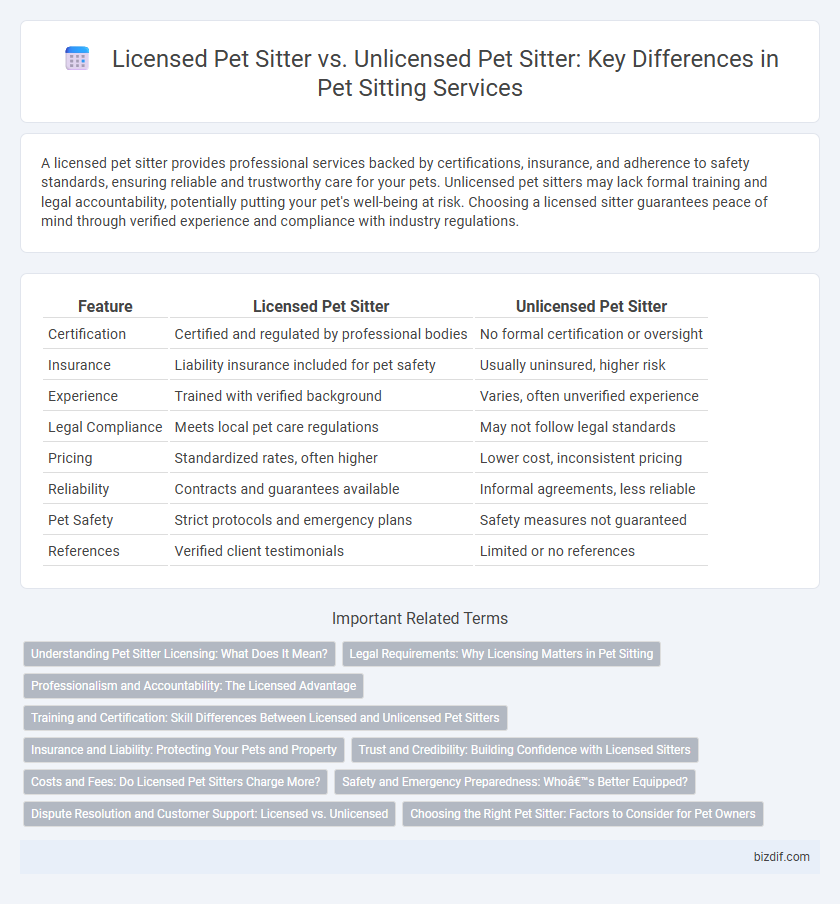A licensed pet sitter provides professional services backed by certifications, insurance, and adherence to safety standards, ensuring reliable and trustworthy care for your pets. Unlicensed pet sitters may lack formal training and legal accountability, potentially putting your pet's well-being at risk. Choosing a licensed sitter guarantees peace of mind through verified experience and compliance with industry regulations.
Table of Comparison
| Feature | Licensed Pet Sitter | Unlicensed Pet Sitter |
|---|---|---|
| Certification | Certified and regulated by professional bodies | No formal certification or oversight |
| Insurance | Liability insurance included for pet safety | Usually uninsured, higher risk |
| Experience | Trained with verified background | Varies, often unverified experience |
| Legal Compliance | Meets local pet care regulations | May not follow legal standards |
| Pricing | Standardized rates, often higher | Lower cost, inconsistent pricing |
| Reliability | Contracts and guarantees available | Informal agreements, less reliable |
| Pet Safety | Strict protocols and emergency plans | Safety measures not guaranteed |
| References | Verified client testimonials | Limited or no references |
Understanding Pet Sitter Licensing: What Does It Mean?
Licensed pet sitters have undergone certification and background checks, ensuring compliance with local regulations and demonstrating professional standards in pet care. Unlicensed pet sitters may lack formal training or legal oversight, potentially increasing risks related to pet safety and service reliability. Understanding pet sitter licensing helps pet owners make informed decisions, prioritizing their pet's well-being and peace of mind.
Legal Requirements: Why Licensing Matters in Pet Sitting
Licensed pet sitters comply with specific legal requirements, ensuring adherence to health and safety standards that protect pets and owners alike. Licensing often involves background checks, certifications, and insurance mandates that reduce liability risks and enhance professional accountability. Hiring a licensed pet sitter guarantees a higher level of trust and legal protection for pet care services.
Professionalism and Accountability: The Licensed Advantage
Licensed pet sitters demonstrate higher professionalism and accountability by adhering to established industry standards, ensuring pets receive safe and reliable care. Licensing often requires background checks, certifications, and insurance, which protect both pet owners and their pets from potential risks. This regulatory oversight distinguishes licensed professionals from unlicensed sitters, fostering trust and peace of mind for clients.
Training and Certification: Skill Differences Between Licensed and Unlicensed Pet Sitters
Licensed pet sitters typically complete formal training and obtain certifications from recognized organizations like Pet Sitters International or the National Association of Professional Pet Sitters, ensuring they possess essential skills in animal care, safety, and emergency response. Unlicensed pet sitters often lack standardized training or certifications, which can lead to gaps in knowledge about handling medical emergencies, behavioral issues, or proper pet nutrition. Certification programs emphasize practical skills and continuing education, setting licensed pet sitters apart through validated expertise and adherence to industry best practices.
Insurance and Liability: Protecting Your Pets and Property
Licensed pet sitters typically carry professional liability insurance and bonding, which safeguard your pets and property against accidents, injuries, or damages during pet care. Unlicensed pet sitters often lack such insurance, exposing pet owners to potential financial risks if incidents occur. Choosing a licensed pet sitter ensures compliance with industry standards and provides peace of mind through verified insurance coverage and liability protection.
Trust and Credibility: Building Confidence with Licensed Sitters
Licensed pet sitters demonstrate verified expertise and adhere to industry standards, fostering higher trust and credibility among pet owners. Their certification often includes background checks, professional training, and insurance coverage, providing peace of mind during pet care. Choosing licensed sitters ensures reliable and responsible pet sitting, enhancing pet safety and owner confidence.
Costs and Fees: Do Licensed Pet Sitters Charge More?
Licensed pet sitters often charge higher fees compared to unlicensed providers due to the costs associated with certification, insurance, and adherence to industry standards. These additional expenses ensure professional liability coverage and peace of mind for pet owners, justifying the premium price. While unlicensed sitters may offer lower rates, the lack of formal credentials can pose risks related to pet safety and service reliability.
Safety and Emergency Preparedness: Who’s Better Equipped?
Licensed pet sitters undergo thorough training in animal care, first aid, and emergency protocols, ensuring they are well-prepared to handle unexpected situations safely. They often have certifications that guarantee adherence to safety standards and emergency preparedness guidelines. Unlicensed pet sitters may lack formal training, making them less equipped to respond effectively during emergencies, potentially putting pets at risk.
Dispute Resolution and Customer Support: Licensed vs. Unlicensed
Licensed pet sitters typically offer structured dispute resolution processes and dedicated customer support, ensuring accountability and client trust. Unlicensed pet sitters may lack formal complaint handling systems, resulting in inconsistent customer support and potential challenges in resolving disputes effectively. Choosing a licensed professional enhances reliability and access to professional recourse in case of service issues.
Choosing the Right Pet Sitter: Factors to Consider for Pet Owners
Choosing the right pet sitter involves evaluating credentials such as licensing, which ensures adherence to industry standards and pet safety regulations. Licensed pet sitters are typically trained in pet first aid and emergency protocols, providing peace of mind for pet owners. Assessing experience, references, and personalized care plans alongside licensing status helps guarantee reliable and responsive pet care.
Licensed pet sitter vs Unlicensed pet sitter Infographic

 bizdif.com
bizdif.com